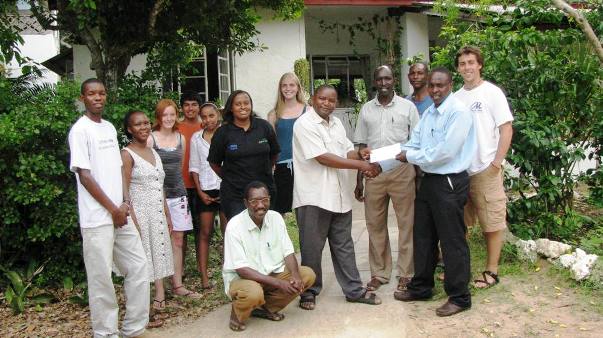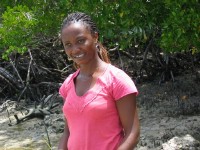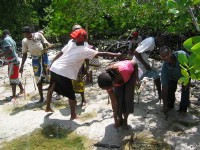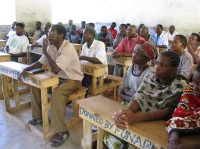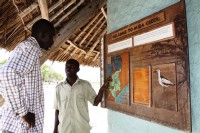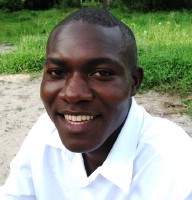Friday 10th March 2010; for the first time in 3 years I rode my iron horse (Yamaha 125cc motorbike) again. Perhaps this time round I wasn’t half as confident as I would have been 3 years ago before the accident that rendered my left wrist stiff. Today the ASSETS team started the process of assessing new students to receive bursaries from the ASSETS eco-bursary scheme. I was assigned the school on the farthest side of the forest (Bogamachuko) where ten students needed assessment. By 10.30 a.m. I am sitting in the head-teacher’s office seeking assistance with directions of where the candidates come from. After drawing a sketch map of roughly where all the students live, I move on starting with the furthest of all, Mwadziwe S. Wale. The process of assessment students for awarding ASSETS eco-bursaries is always such a humbling exercise. Here one encounters some of the most desperate financial statuses you can imagine. The sight of poverty, hunger, malnutrition and despair makes one feel not only wealthy riding a motorbike but also wildly extravagant. The most encouraging thing today has been that parents have really struggled and sent most of the students to school in the hope that ASSETS will come in their aid sooner. You can always tell they have been waiting for someone from ASSETS as soon as you introduce yourself to the very humble folks, as though saying uh, at here last!
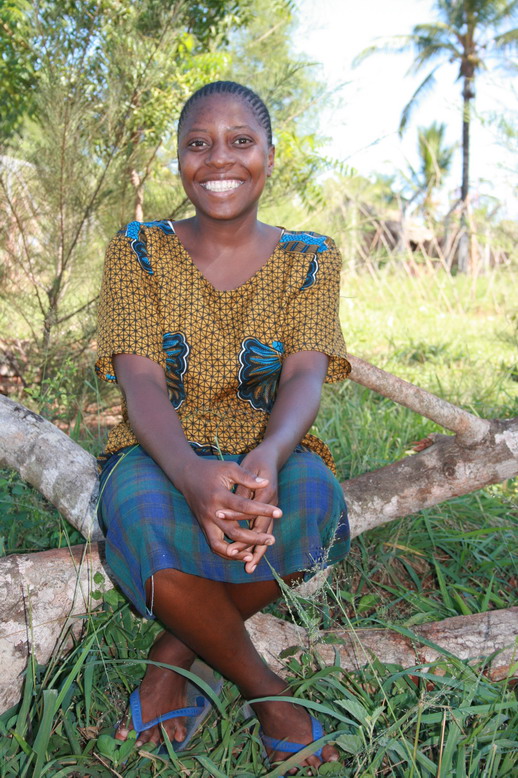
Introducing Cecilia
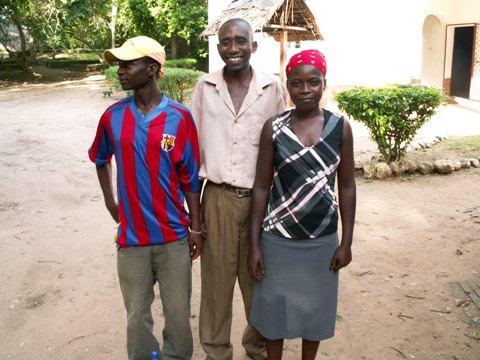
All protocol observed; the lady in this photo is Cecilia Mwarandu; a graduate of the ASSETS eco-bursay scheme. Cecilia completed her secondary school in 2008 at Ngala Girls Secondary school and is searching for opportunities to join college. Cecilia is joining John to help welcome visitors to Gede monument and issue tickets to those wanting to use the facility. This is one of the measures we are putting in place to maximise the very promising tourist projections later in the year.
Community Claims their own!
Since the formation of Muvera wa ASSETS, an association of the ASSETS beneficiaries, the community has been asking about the benefits of the Arabuko Tree Platform. This facility which was built by A Rocha Kenya to generate income for secondary school scholarships has not been used since 2005. Even after lengthy discussions with Kenya Wildlife Services and Kenya Forest Service regarding the ownership of the facility permission to charge for the use of the Tree platform was not granted.
A month ago, the ASSETS beneficiaries formed a task force to steer the process of repossesing the facility and put it into use to supplement the income already being earned at Mida Creek by the community. Today the task force met to plan on the way-forward. This meeting took place at the site; Arabuko swamp, after a long chat about the baboons that raid their farms. Very enthusiastic about the whole process, the task force planned a meeting with the warden, Kenya Wild life Service to explain why they should be allowed to charge tourists for the use of the facility. The big meeting is scheduled for Thursday the 9th. Fingers crossed, we hope it will be a peaceful meeting and that the best decision will be made.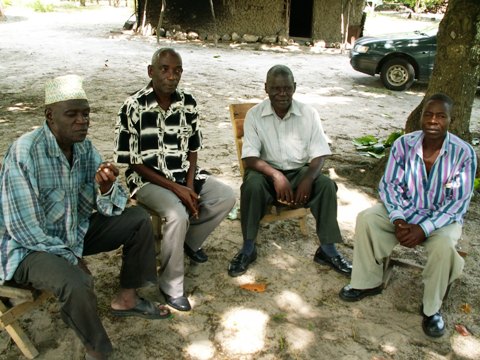
Planning for the Mida Bird Hide renovations
At last we can meet and plan for the renovations. For the last six months we have been waiting for this moment. The Safaricom Foundation has very generously given us a grant of Ksh. 750,000 (USD 9,600) for a complete overhaul of the Mida Creek walkway and Bird hide which has in the last four years contributed over 100 bursaries to the local secondary school children.
This facility has been closed for the last one month awaiting funds as promised by the foundation.
Todays meeting was to select five casual employees from the community to work on the facility. Rojan Taylor, a local engineer has offered to help us with designing and implementing the renovations.
My day started very well this morning. While getting ready to go to work, I was listening to the radio basically for the weather focast to know whether I need a rain-coat or not but in the process heard more pleasant news. Tourism projections for the rest of the year according to the Citizen Radio news bulletin this morning look very encouraging. With over 80% bed-night bookings for hotels along the coast, there is at last light at the end of the tunnel. The renovations are therefore very timely as they will be completed just before the tourism season peaks.
Where the rubber hits the road!
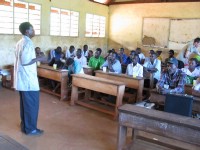 Over the last two weeks, we were involved in a vigourous environmental education programme. The whole ASSETS team dropped everything else to participate in meetings with the ASSETS beneficiaries. This time we were meeting both the parents and students in two seperate meetings. It is always fun to welcome the new beneficiaries to the ASSETS scheme and see how exited they are. Meetings started with the closest school, Mida where we were meeting with students from Mida and Chipande primary schools. We then proceeded to Nyari primary school on the southern side of the forest where we were meeting over 70 students. Bogamachuko and Kahingoni primary schools where most of the beneficiaries come from were next . It is always very pleasing to meet these very cheerful students who almost entirely depend on the ASSETS bursaries for their education. We camped at Bogamachuko for the night in order to save on fuel and cut our carbon footprint by not driving back the 70 km to Watamu just for the night. By 9.00 a.m. we were at Malanga to meet students from Malanga and Girimacha primary school. Last was Mijomboni primary school on Friday the 24th.
Over the last two weeks, we were involved in a vigourous environmental education programme. The whole ASSETS team dropped everything else to participate in meetings with the ASSETS beneficiaries. This time we were meeting both the parents and students in two seperate meetings. It is always fun to welcome the new beneficiaries to the ASSETS scheme and see how exited they are. Meetings started with the closest school, Mida where we were meeting with students from Mida and Chipande primary schools. We then proceeded to Nyari primary school on the southern side of the forest where we were meeting over 70 students. Bogamachuko and Kahingoni primary schools where most of the beneficiaries come from were next . It is always very pleasing to meet these very cheerful students who almost entirely depend on the ASSETS bursaries for their education. We camped at Bogamachuko for the night in order to save on fuel and cut our carbon footprint by not driving back the 70 km to Watamu just for the night. By 9.00 a.m. we were at Malanga to meet students from Malanga and Girimacha primary school. Last was Mijomboni primary school on Friday the 24th.
This year's theme for our meetings was "Bush Meat Trade". The students had an opportunity to learn about the consequences of Bush Meat Trade and particularly on the ASSETS eco-bursary scheme. In deed this is a really crucial activity where the primary aim of the ASSETS scheme can be realised.
A Mongrove Planting Day
It is Thursday morning and every one is up and ready to join hands together in building our nation. At A Rocha Kenya where I am on attachment we up for another day of conservation; particularly creating a better environment. Being a student of Tourism Management, my duty is mostly helping issue tickets at one of the ASSETS Eco-Tourism facilities; the tree platform at Gede Ruins. Thus I commence my day as usual and head to my place of work.
A phone call from the ASSETS Co-ordinator informs me that today I am supposed to join a group of community members planting mangroves at Sita, a village along the Mida creek; an activity that turns out to be the climax of my three weeks stay at A Rocha. It was fun!
It was here that I was to learn that mangroves are actually trees belonging to totally different families of plants and that traditionally they have medicinal value. The mangrove forest also creates a healthy fish and crustacean habitat. We planted approximately one thousand seedlings which took us less than one hour since we had a group of 15 people. The team effort exercised was fun! I however had quite some scary experiences; 1st walking on the soft, muddy ground with millions of tickling miniature shells. Some huge hermit crabs carrying shells twice their size was also quite breath-taking.
After the mangrove planting we visited a snake project which has been put up by the Sita community. Here we saw a number of different kinds of snakes including the African rock python, Puff adders, a spitting cobra and green mamba among others. The objective of this initiative is create awareness to the communities about the poisonous snakes and the harmless ones. It was indeed a fascinating, scary, fun and a very useful experience!
ASSETS Need Assessment
"therefore do not worry about tomorrow, for tomorrow will worry about itself" Goodness! this may sound really foolish to most of you, but what do you do if you cannot even find fair solutions for today? This is one of the most quoted verses by christian religious counsellors that I am not sure whether they really mean it or they are using it as a booksellig metaphor.
Today I found myself murmuring these words to myself even though I am not a counsellor. We went to Bogamachuko,one of the communities to the west of Arabuko-Sokoke Forest that benefits from the ASSETS programme. Accompanied by Frossy Nelly a student on attachment from Coast Institude of Technology, we had gone to assess potential beneficiaries to receive bursaries from ASSETS this year. At the home of Patience Ngole, one of the applicants, we found three old ladies, one of whom was Patience's mother and two young girls. All the five were gathered together preparing mchunga (a wild vegetable) that hadly had any leaves due to the very dry conditions of the place. This was meant to be the lunch for the ladies who explained that all the men had gone to towns looking for employment. We stared our interview and established that Patience's dad who lives and works in Kilifi has not been supporting the family at all and the mother had to do it all by herself. As the interview goes on, Kanze, Patience's sister who is deaf and dumb appears. At 15 years of age Kanze has not been taken to school yet. Sitting next to her mother she keeps on smiling as she follows on our conversation by lip reading. "I wish I went to school," Patience mother says. "Then I would have known that there are schools for deaf and dumb as well" Thanks to the area civic leader who has secured a sponsor and a place for her at Kibarani school for the deaf.
It's 2.15 p.m. and we have to move to the other applicants. "Do not worry about tomorrow, for tomorrow will worry about itself" I murmer as we head back to the car.
Eco-Bursaries; where is the link?
It may sound one thing to give bursaries to needy children and totally another thing to do environmental conservation. Now this assumption is what makes ASSETS unique as it keeps a very close link between the two qualifying it to be an "Eco-Bursary" fund. ASSETS beneficiaries days are meetings organised by the ASSETS committee for all the ASSETS beneficiaries during which the link between the bursaries, eco-tourism in Arabuko-Sokoke forest and Mida Creek and conservation is made. During this year's meetings, the main focus is sustainable utilisation of natural resources, challenges faced by students in secondary school and HIV/AIDS among students.
Five meetings are organised this year at Mida, Nyari, Bogamachuko, Malanga and Mijomboni primary schools. A really tight schedule has been planned to make ensure maximum impact of the exercise. In preperation, Juice and biscuits have been purchased to nourish the participants during the all day meetings.
A Management Audit
It has been quite a long day again on the truck! After spending almost a whole morning at Mida creek together with Colin, A Rocha Kenya's national director, and later to a workshop at Ngala girls' secondary school we came back to the centre for lunch and more interviews. A Rocha Kenya is at the moment conducting a management audit to aid in a better and logical expansion of its programmes. This will also enhance improved effectiveness in the organisation's performance. Very characteristic of the audit have been the lengthy and very detailed interviews being conducted. This will however help us a great deal when it comes to strategic planning budgeting and implementation of our projects.
GIFT Awarded to Oscar
His name and photo has featured in many of both ASSETS and A Rocha newsletters. Possibly all the ASSETS beneficiaries know him. Severally he has delivered moving speeches as a representative of the ASSETS beneficiaries in different forums including during the official openeng of the Arabuko Tree platform; one of the 3 ASSETS eco-tourism facilities. Oscar Mwaro is the very 1st student to be considered as an ASSETS beneficiary. Oscar was enrolled in Lenana School in 2002 where he gratuated with grade B. Since leaving school, Oscar has been teaching French in a private institute in Watamu while trying to save enough money to join University.
His dream came true last week when he was considered to receive support for his university education by GIFT International. Grassroot Initiative Funding and Training (GIFT International) is a UK based charity that supports local community initiatives and training for the purpose of environmental conservation.
A huge burden off his shoulders! Oscar will be joining university in mid 2009 for a degree in environmental science. Oscar is very keen to come back and support the conservation of Arabuko-Sokoke Forest when he graduates from the university.






